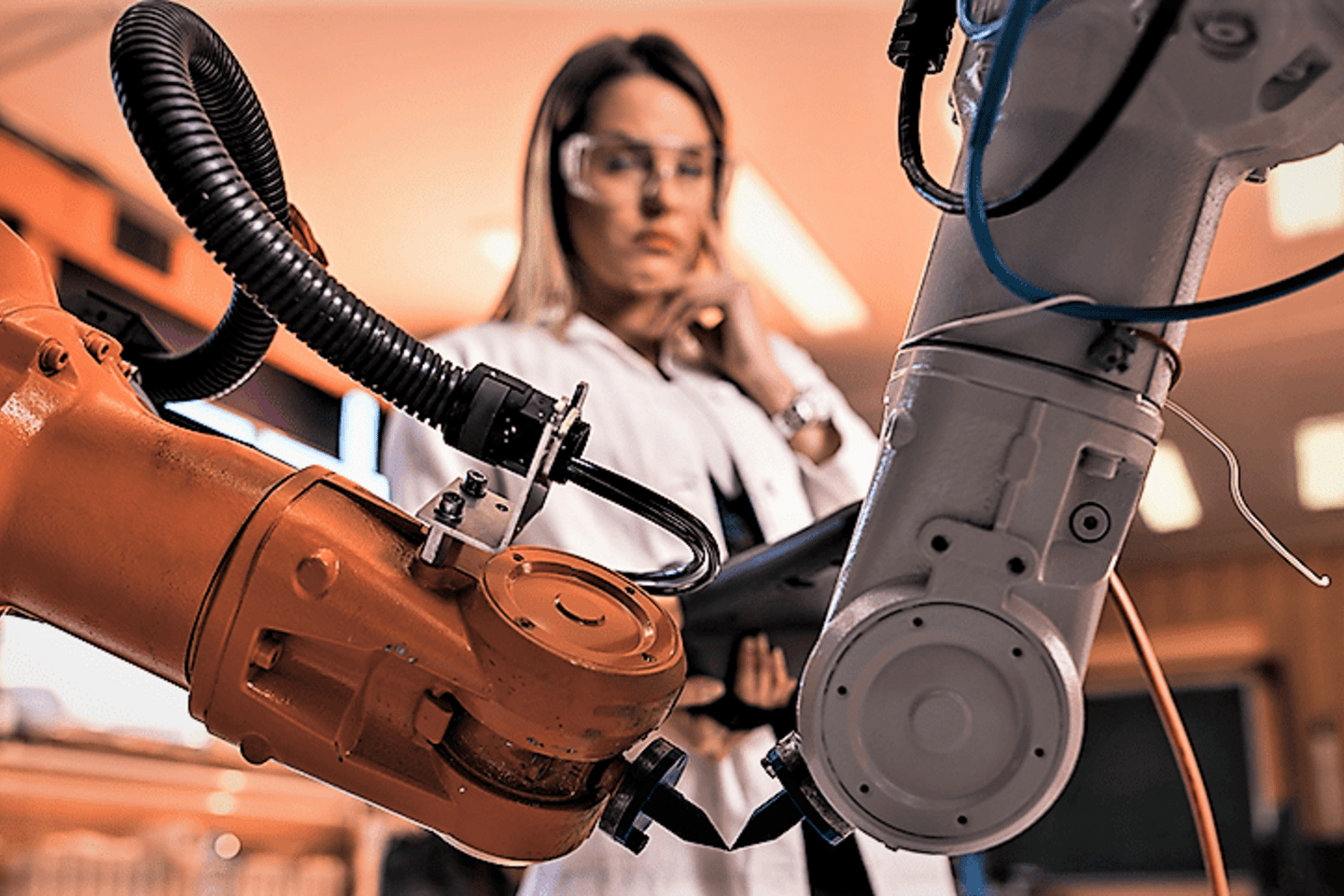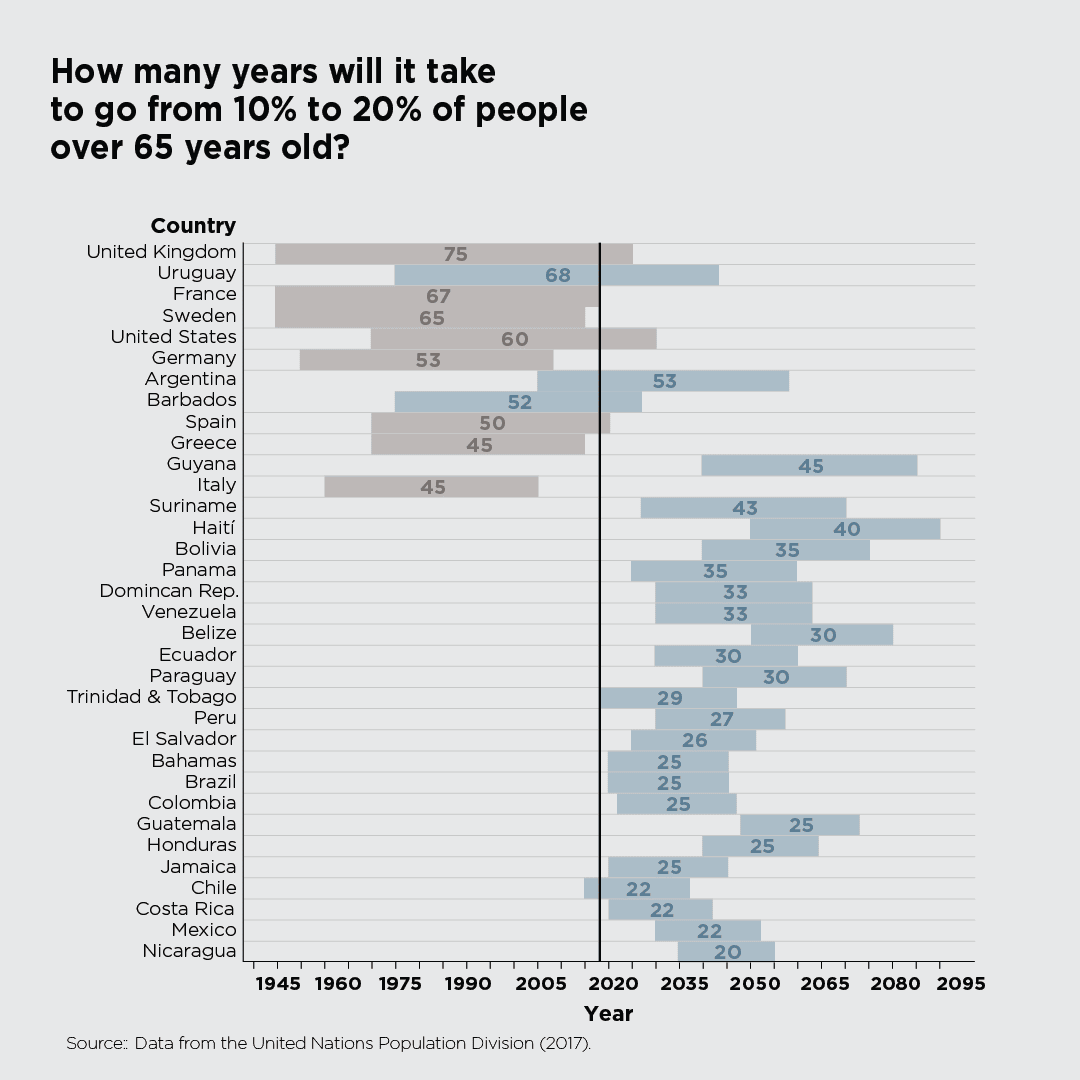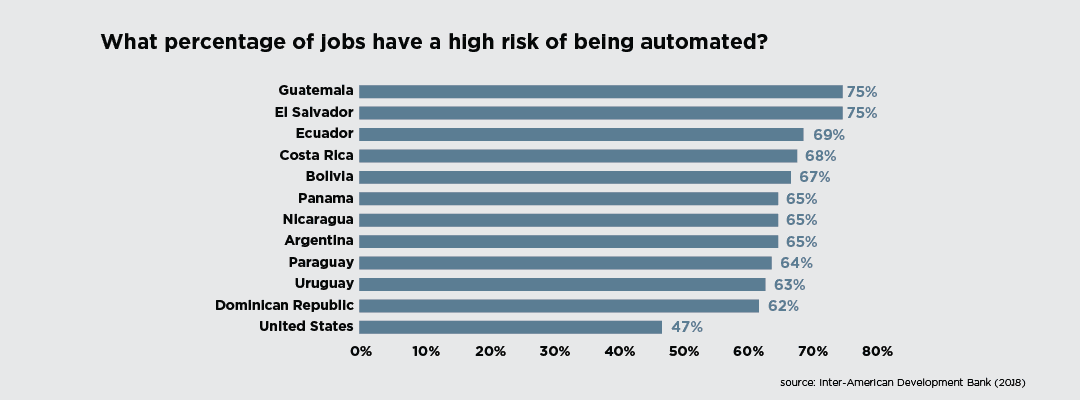
November 2018
Brenda Hali lives in Mexico but works remotely as marketing manager for a company in Silicon Valley. This gives her the flexibility to design her schedule, allowing her to study and travel. It is a model that works well for her. "I like the freedom I have to manage my time and choose where to work from. At least in my generation, we value this balance between life and work, but also between traveling and being productive," she says.
In the future, a large number of Latin Americans will work this way.
The future of work in the region is shaped by two major trends: a quick technological development and an aging population. These changes signal a positive shift because they could allow us to live longer, quit repetitive jobs and improve our quality of life.
However, it is important to act decisively to take advantage of these potential benefits. It will not be an easy task. Compared to developed countries, those in Latin America and the Caribbean currently do not have the skills, abilities and infrastructure necessary to respond to the technological revolution and demographic change.
One of the great challenges is the lack of training. The low levels of qualified workers in the region limit the adoption of new technologies and the capability of workers to adjust to them. In other regions of the world, improvements in automation and artificial intelligence replaced many jobs that are routine and that do not require abstract reasoning to be carried out. Those technologies have also created many new jobs for highly qualified people. This opens up job opportunities for workers who receive additional training in advanced skills.
In Latin America and the Caribbean, part of the problem is that companies have little incentive to invest in training for their employees and on technologies that improve their productivity. The low cost of labor discourages automation, and most of the companies in the region are small, which hinders innovation. For example, in Peru 27% of companies have incorporated new technologies, of which only 7% use advanced network services, according to the Survey of Work Skills (ENHAT, in Spanish). This reduces the competitiveness of regional businesses when compared to their peers in other countries.
In the coming years, this could put many workers at risk. According to a growing body of research, up to 75% of jobs have a high risk of becoming automated in several countries in the region.

In terms of demographic change, the region is aging at an accelerated pace. In other countries, it took between 50 and 75 years for the number of adults over 65 to increase from 10% to 20%. In some Latin American countries, such as Nicaragua and Mexico, this will happen in less than 25 years.
This represents a significant challenge to social security systems because they are not prepared to serve a growing aging population: their coverage is very limited; pensions are often insufficient; and, in most cases, their financial and social sustainability is not guaranteed.

A New Frontier
So, what is the future of work? As has happened with every previous technological change, some jobs will be lost and new ones will be created. The most likely labor shift will be around automation, artificial intelligence and digital platforms.
In particular, new jobs will be invented to complement or work in conjunction with technology, especially as 'trainers' for artificial intelligence, 'explainers' to communicate the results of these systems, or 'supporters' to monitor their behavior, including their adherence to ethical conducts.
"What I would suggest to my children is that they should specialize in one of these fields. Either in something that complements artificial intelligence, such as the ability to solve problems, or in something that machines can hardly substitute such as empathy towards another human being," says Julian Messina, lead specialist at the IDB's Research Department. "Everything that is interpersonal work that requires communication, not only verbal but also non-verbal, will be very difficult to replace with machines".
For Brenda, her technological expertise in a field that requires interpersonal communication grants her a comparative advantage over others elsewhere in the world. She identifies her qualifications as a mixture of technical, social and analytical skills. "I can divide my skills in two: soft skills and hard skills. On the one hand, my adaptation to technology gives me an advantage and, on the other, in soft skills there are several things: one is the multicultural part and on the other is the ability to manage time with a result-driven focus," she says.
Traditional jobs will still exist, even when many of them will be hired through digital platforms such as Uber, Airbnb or Rappi. These types of platforms eliminate barriers of access to work, which can generate jobs for people who require a high degree of flexibility on their schedules. They can also facilitate work for those seeking part-time jobs such as the elderly or students.
"What I would suggest to my children is that they should specialize in one of these fields. Either in something that complements artificial intelligence, such as the ability to solve problems, or in something that machines can hardly substitute such as empathy towards another human being."
These platforms allow companies to locate and hire workers for specific tasks without having to establish an employment relationship. For some people, this provides a coveted flexibility; for others, it means the end of the protections and benefits given by a full-time job.
These new ways to work also pose a challenge to social security programs. Traditionally, health and pension systems are designed to operate with people hired with a full-time job by a single employer. Those employed under these digital platforms will have a very different set of circumstances.
According to Laura Ripani, senior specialist at the IDB’s Division of Labor Markets, governments need to design new social security mechanisms for independent workers who use these platforms. "It is extremely important that countries start thinking of technology as an ally, especially for these independent workers. Since they will use technology to get a job, the State could rely on those same platforms to get them to contribute to social security," she says.
The main recommendation from the IDB’s specialists to all these challenges is for workers to continue training themselves throughout their lives; and for businesses to identify the skills needed in the market, while investing in education for their employees. "The best response to the challenge of technological development is education. It is in this aspect where we can kill two birds with one stone: take advantage of the new technologies and achieve a more inclusive society with less inequality", says Messina.
For Brenda, education has always been the key to getting better jobs in an evolving labor market. "I feel optimistic because I try to educate myself. Every week I'm learning something new and this means that I’m on top of the marketing trends, how things are changing, algorithms or where companies are investing,” she says.
You can check the first part of our The Future of Work series here.